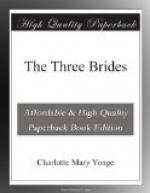For one moment she had slipped back her little mantle, then drawn it on, as, taking her husband’s arm, she left the room; but that moment had set Anne’s cheeks aflame, and left Mrs. Poynsett in a startled state of uncertainty, hoping her glance had been mistaken, wondering what could have been more amiss, and feeling incapable of entering on the subject with that severe young judge, of narrow experience.
Never had her eldest son failed to come and bid her good night on his way to his own room: it was the great break in her long sleepless hours, and she used to call it a reversal of the relations of those days when he used to watch for her kiss on her way to bed. Nor did he fail her now, but came and stood over her with his fragmentary tidings.
“An immense party—oh yes, there was he persuading them not to wait. Mr. Bowater took Rosamond in to dinner, Cecil went with Sir Harry Vivian. Yes, Lady Tyrrell was there, wonderfully handsome, but her expression strikes me as altered; there is the sort of pathetic look that, as Cecil said, is like the melancholy Medusa—I wonder if it is genuine. She seems greatly disposed to cultivate Cecil—I wonder what she does it for.”
“Is Cecil attracted? I fancied she was.”
“Yes, a good deal; and I fear the Wil’sbro’ business will throw them together. It is unlucky on Frank’s account likewise. I see we shall have it all over again there.”
“I have great hope in his office taking him away. How was it with them to-night?”
“What I should call arrant coquetry, such as even Camilla never indulged in. The girl kept out of his way—was absolutely chill and repelling half the evening—throwing herself at the officers from Backsworth, till at last Frank obtained a waltz, and after that they were perfectly inseparable.”
“If she coquets, she will soon disgust him! Did Cecil enjoy herself?”
“Oh yes: Phil Bowater opened the ball with her, and she dances very nicely—so quietly, Mrs. Bowater remarked it. As to Rosamond, she was in her native element—is indeed, for she would not hear of coming away when we did.”
“And Julius?”
“Standing in a doorway, with others of his kind, absently talking, and watching Rosamond out of the tail of his eye. I say, mother,” lowering his voice, “can’t you give Rosamond a hint about her dress? Cecil says she can’t go out with her again like that. Ah,” as he heard a sigh, “I should not have worried you at night.”
“No, you have not. Tell Cecil I will see about it. Rosamond will take it best from an old woman like me.”
Mrs. Poynsett was quite conscious that Cecil had more high breeding and refinement than Rosamond, who was essentially the Irish Colonel’s daughter, and that the cold temperament of the one irritated the warm nature of the other. More than one flash had revealed Rosamond’s contempt for Cecil’s assumptions and intolerance for her precision—besides, she was five years older, and had not an ideal in Dunstone.




